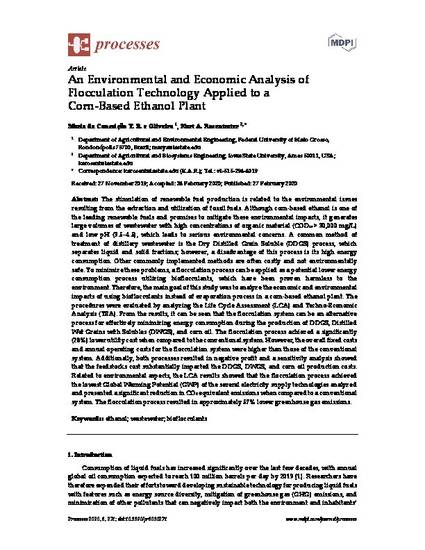
The stimulation of renewable fuel production is related to the environmental issues resulting from the extraction and utilization of fossil fuels. Although corn-based ethanol is one of the leading renewable fuels and promises to mitigate these environmental impacts, it generates large volumes of wastewater with high concentrations of organic material (CODcr > 30,000 mg/L) and low pH (3.5–4.5), which leads to serious environmental concerns. A common method of treatment of distillery wastewater is the Dry Distilled Grain Soluble (DDGS) process, which separates liquid and solid fractions; however, a disadvantage of this process is its high energy consumption. Other commonly implemented methods are often costly and not environmentally safe. To minimize these problems, a flocculation process can be applied as a potential lower energy consumption process utilizing bioflocculants, which have been proven harmless to the environment. Therefore, the main goal of this study was to analyze the economic and environmental impacts of using bioflocculants instead of evaporation process in a corn-based ethanol plant. The procedures were evaluated by analyzing the Life Cycle Assessment (LCA) and Techno-Economic Analysis (TEA). From the results, it can be seen that the flocculation system can be an alternative process for effectively minimizing energy consumption during the production of DDGS, Distilled Wet Grains with Solubles (DWGS), and corn oil. The flocculation process achieved a significantly (28%) lower utility cost when compared to the conventional system. However, the overall fixed costs and annual operating costs for the flocculation system were higher than those of the conventional system. Additionally, both processes resulted in negative profit and a sensitivity analysis showed that the feedstocks cost substantially impacted the DDGS, DWGS, and corn oil production costs. Related to environmental aspects, the LCA results showed that the flocculation process achieved the lowest Global Warming Potential (GWP) of the several electricity supply technologies analyzed and presented a significant reduction in CO2 equivalent emissions when compared to a conventional system. The flocculation process resulted in approximately 57% lower greenhouse gas emissions.
Available at: http://works.bepress.com/kurt_rosentrater/353/

This article is published as da Conceição T. B. e Oliveira, Maria and Kurt A. Rosentrater. "An Environmental and Economic Analysis of Flocculation Technology Applied to a Corn-Based Ethanol Plant." Processes 8, no. 3 (2020): 271. DOI: 10.3390/pr8030271. Posted with permission.